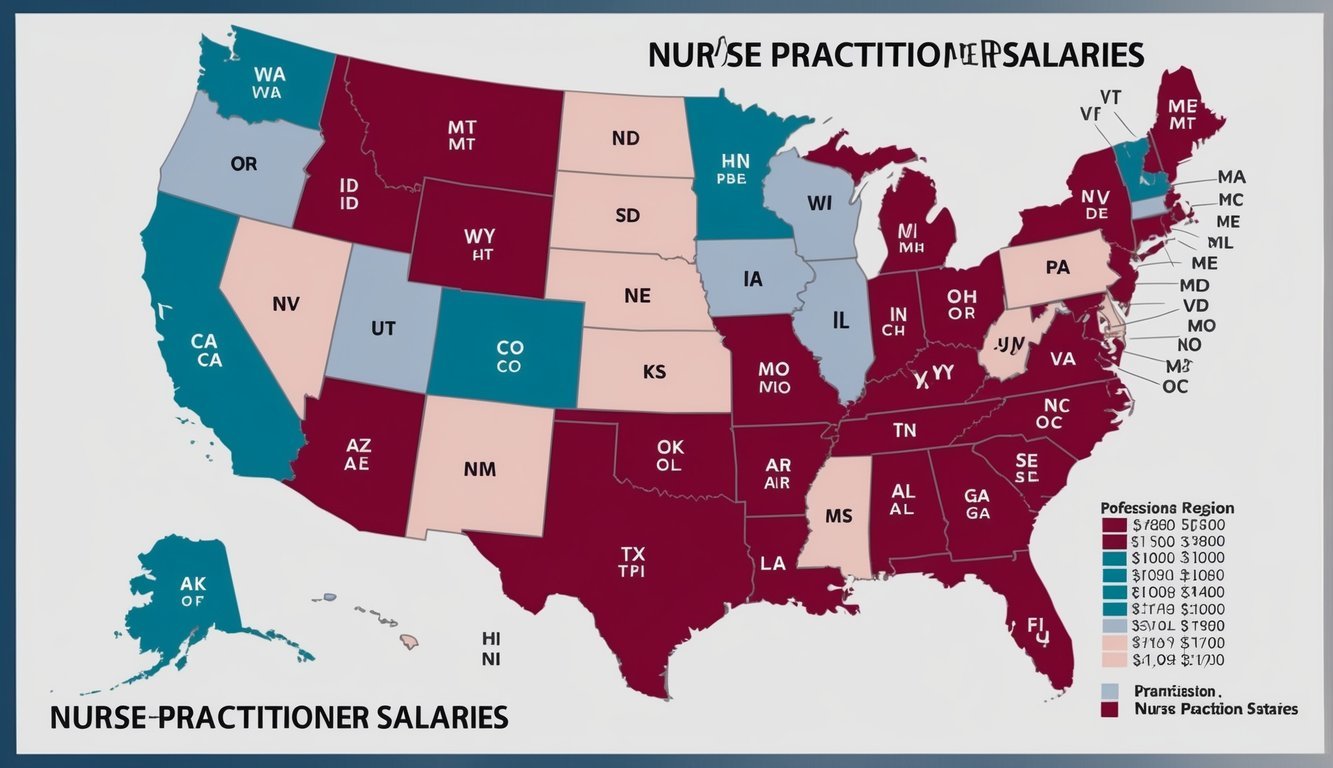Nurse practitioners (NPs) play a crucial role in the healthcare system.
They provide quality patient care and often earn competitive salaries. The average annual salary for nurse practitioners is around $126,260.
However, this can vary significantly based on factors like location and specialty. With a growing demand for healthcare services, understanding what NPs make can help you gauge potential career pathways and financial rewards in this field.
Your educational background and specialization also influence your earning potential.
For example, acute care nurse practitioners tend to earn higher salaries compared to those in primary care.
Whether you are considering a career as an NP or are simply curious about the profession, this article provides a detailed look at nurse practitioner salaries.
Key Takeaways
- Nurse practitioners earn an average salary of about $126,260 per year.
- Salary varies by geographical location and specialized fields.
- The demand for nurse practitioners continues to rise in the labor market.
Qualifications and Education

To become a nurse practitioner, you need specific qualifications and educational requirements.
This path involves earning essential credentials, obtaining an advanced degree, and obtaining certification and licensure.
Each of these steps is crucial to your success in the field.
Essential Credentials
The first step is becoming a Registered Nurse (RN).
You can achieve this by completing an Associate Degree in Nursing (ADN) or a Bachelor of Science in Nursing (BSN).
Both programs provide you with the foundational nursing skills needed for advanced practice.
After you complete your nursing education, you must pass the NCLEX-RN exam to obtain your RN license.
This is a necessary credential as you cannot progress to being a nurse practitioner without it.
It’s also beneficial to gain clinical experience as an RN.
This experience helps you build skills for your future role.
You can work in various settings like hospitals, clinics, or community health organizations.
Advanced Degree Requirements
Once you have your RN license, the next step is to pursue further education.
Most nurse practitioners hold a Master’s of Science in Nursing (MSN) or a Doctor of Nursing Practice (DNP) degree.
An MSN program often focuses on advanced clinical practice and may allow you to specialize, such as becoming a family nurse practitioner or an acute care nurse practitioner.
DNP programs provide a higher level of education, focusing on leadership, policy, and the application of research.
Completing either an MSN or DNP will prepare you for the roles and responsibilities of a nurse practitioner in various specialties.
Certification and Licensure
After completing your advanced degree, you will need to obtain national certification.
This involves passing a certification exam specific to your chosen specialty area, such as family or acute care nurse practitioner.
Certifying bodies, like the American Association of Nurse Practitioners (AANP), offer these exams.
Your certification is a vital step, as it demonstrates your expertise and readiness to practice as an NP.
Finally, obtaining state licensure is necessary to practice.
Each state has its own requirements regarding licensure, so it’s important to check your state’s regulations.
This ensures that you can legally provide care in your desired location.
Nurse Practitioner Salary Overview
Nurse practitioners (NPs) earn competitive salaries that vary by location, experience, and specialty.
Understanding the average earnings and key factors influencing these salaries can help you gauge what to expect in this profession.
Average Nurse Practitioner Salary
The average nurse practitioner salary in the United States is significant.
According to data, NPs earn around $126,260 annually, translating to approximately $61.78 per hour.
This figure can fluctuate based on state and local economic conditions.
Here’s a brief breakdown of average salaries by state:
| State | Average Salary |
|---|---|
| California | $145,979 |
| Texas | $121,000 |
| New York | $134,000 |
| Florida | $112,000 |
For more specific information on salaries by state, you can visit Nurse Practitioner Salaries by State.
Factors Influencing NP Salary
Several factors impact your salary as a nurse practitioner.
Key elements include:
-
Geographical Location: Salaries differ widely based on the state and city. For example, NPs in California tend to earn more than those in less populated or rural states.
-
Specialty: NPs working in specialized fields such as pediatrics or emergency care often command higher salaries compared to those in general practice.
-
Experience: As with many professions, experience plays a crucial role. Newer NPs may start at lower salaries while those with several years can earn significantly more.
These factors illustrate the varied landscape of nurse practitioner salaries.
For deeper insights, check the Nurse Practitioner Salaries By State.
Geographical Variations in NP Salary

Your salary as a nurse practitioner (NP) can significantly vary based on where you practice.
Factors like state regulations, demand for healthcare, and cost of living play essential roles in determining your earnings.
Highest-Paying States for Nurse Practitioners
When it comes to salaries, certain states lead the way.
According to recent data, the highest-paying states for nurse practitioners include:
| State | Average Salary |
|---|---|
| California | $138,000 |
| New York | $135,000 |
| Texas | $130,000 |
| Alaska | $129,000 |
| Connecticut | $125,000 |
In these states, factors like high demand for healthcare services and advanced practice regulations often contribute to competitive salaries.
Keeping an eye on the salaries in these regions might guide your career decisions.
Impact of Cost of Living
While higher salaries may be appealing, you must also consider the cost of living in each state.
A high salary in one state may not go as far if living costs are considerably elevated.
For instance, California has high salaries but also a high cost of living, particularly in cities like San Francisco.
Consider the following examples of cost of living indexes compared to average NP salaries:
| State | Cost of Living Index | NP Average Salary |
|---|---|---|
| California | 153 | $138,000 |
| Texas | 90 | $130,000 |
| New York | 187 | $135,000 |
This table illustrates that while salaries may vary greatly, understanding how far your earnings can stretch in different contexts is crucial.
Highest Paying Cities for Nurse Practitioners
Specific cities also offer higher salaries for nurse practitioners.
Major metropolitan areas typically pay more due to increased demand for healthcare services.
Some of the top-paying cities include:
- San Francisco, CA: $150,000
- New York City, NY: $145,000
- Seattle, WA: $140,000
- Boston, MA: $138,000
- Washington, D.C.: $136,000
In these cities, NPs often face a more demanding workload, but the compensation reflects that challenge.
You may want to consider not just salary but also quality of life when choosing where to work.
Specialties and Earnings Potential
As a nurse practitioner (NP), your specialty significantly influences your earnings potential.
Different areas of focus not only offer varied salaries but also present unique opportunities in healthcare.
Here is an overview of some key specialties that impact income.
Pediatric Nurse Practitioner
A Pediatric Nurse Practitioner (PNP) focuses on the healthcare needs of infants, children, and adolescents.
This specialty requires specific training in child development and family dynamics.
The average salary for a PNP is around $117,000 per year.
Factors like location, experience, and the type of healthcare facility can impact earnings.
PNPs working in urban areas or specialized clinics often earn higher salaries due to demand.
In addition to salary, PNPs often enjoy a rewarding career focused on improving children’s health outcomes.
For resources on becoming a Pediatric Nurse Practitioner, visit Nurse.org.
Psychiatric Nurse Practitioner
Psychiatric Nurse Practitioners (PNPs) specialize in mental health care, assessing and treating patients with psychological disorders.
This role is essential in addressing the growing need for mental health services in various settings.
The average salary for a Psychiatric Nurse Practitioner is approximately $125,000 annually.
Many factors influence this figure, including certifications, location, and whether you work in a private practice or a hospital.
As a PNP, you have the opportunity to make a significant impact on patients’ lives while enjoying a lucrative career.
For more information, check out NPHub.
Other High-Demand Specialties
Several other high-demand specialties can lead to substantial earnings as a nurse practitioner.
Here are a few notable examples:
| Specialty | Average Salary |
|---|---|
| Neonatal Nurse Practitioner | $138,000 |
| Adult-Gerontology Nurse Practitioner | $120,000 |
| Women’s Health Nurse Practitioner | $115,000 |
| Orthopedic Nurse Practitioner | $125,400 |
| Aesthetic Nurse Practitioner | Varies widely |
Each of these specialties plays a crucial role in healthcare and offers competitive salaries.
The demand for specialized NPs continues to grow, creating excellent career opportunities.
Labor Market Outlook

The labor market for nurse practitioners (NPs) is strong and continues to grow.
Several factors, including an aging population and nursing shortages, contribute to this trend.
Understanding the current demand and future projections can help you navigate your career in this field.
Current Demand for Nurse Practitioners
There is a high demand for nurse practitioners across the United States.
According to the U.S. Bureau of Labor Statistics, approximately 137,030 NPs work in offices of physicians, showcasing a significant employment sector.
Several factors drive this demand:
- Aging Population: As more people age, they require healthcare services, leading to more job openings for NPs.
- Healthcare Expansion: Policies aimed at expanding healthcare access also increase NP roles.
- Nursing Shortage: The ongoing nursing shortage places more responsibilities on NPs.
This combination means that job stability and opportunities are promising for NPs today.
Future Projections
The Bureau of Labor Statistics projects that NPs will experience a 40% employment growth from 2023 to 2033.
Key factors influencing this growth include:
- Increased Demand for Healthcare: More patients will seek care, requiring more providers.
- Regulatory Changes: Many states are easing restrictions on NP practices, enabling them to serve patients more effectively.
| Year | Projected Growth Rate |
|---|---|
| 2023 | 40% |
| 2033 | More job openings |
With a projected growth rate of 40%, entering the NP profession offers strong potential for career advancement and job security.
For more information, check the U.S. Bureau of Labor Statistics for trends and data related to nurse practitioners.
Frequently Asked Questions

If you’re curious about nurse practitioners’ salaries, several key areas to consider include annual earnings, hourly wages, and factors influencing pay.
Here is important information regarding what you can expect as a nurse practitioner.
How much does a nurse practitioner earn annually in the United States?
As of May 2023, nurse practitioners in the U.S. earn a median annual salary of about $126,260, according to the U.S. Bureau of Labor Statistics.
Salaries can vary by location, experience, and specialty.
What is the average hourly wage for a nurse practitioner?
The average hourly wage for nurse practitioners is approximately $60.71.
Depending on your experience and where you work, this rate can change significantly.
What is the entry-level salary for a nurse practitioner?
Entry-level nurse practitioners typically earn between $46.46 and $54.36 per hour.
Annual salaries for those just starting can range from about $96,000 to $113,000.
Which nurse practitioner specialty is the highest paid?
Nurse practitioners specializing in acute care or emergency medicine often earn the highest salaries.
According to data, specialized roles can reach above the median wage mentioned earlier.
What factors influence the salary range for nurse practitioners in different states?
Several factors influence salaries for nurse practitioners, including demand for healthcare services in a state, cost of living, and state regulations regarding practice.
For detailed state-specific information, visit resources like Nurse.org.
What is the typical monthly income for a nurse practitioner?
Nurse practitioners typically earn around $10,500 per month.
This is based on an annual salary of about $126,260.
The amount can vary based on hours worked and any bonuses received.

